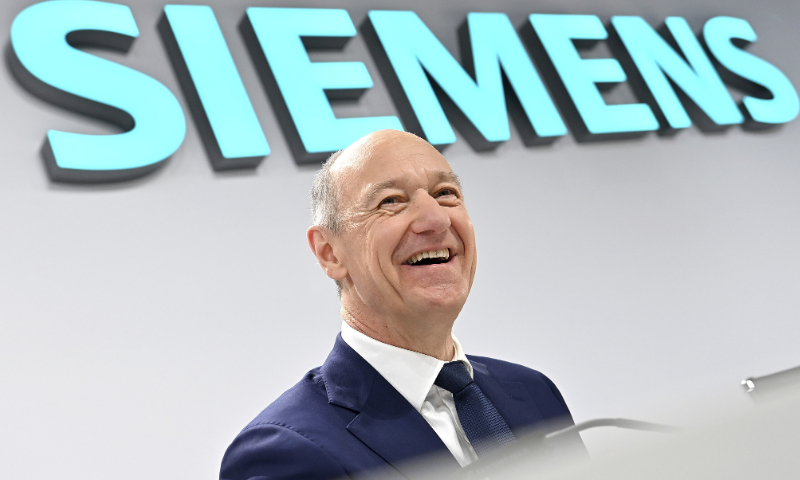MIIT minister meets Siemens CEO, highlighting opening of China's manufacturing industry

Siemens CEO Roland Busch Photo: VCG
China's Minister of Industry and Information Technology Jin Zhuanglong met with Siemens CEO Roland Busch and his delegation in Beijing, highlighting the opening-up of China's manufacturing industry.
Jin said that the Chinese government attaches great importance to promoting the deep integration of the digital economy and the real economy, and is accelerating the development of high-end, intelligent and green manufacturing.
The ministry will comprehensively promote high-level opening-up in the manufacturing industry, create a market-oriented, rule-of-law-based and internationalized first-class business environment, support multinational enterprises to increase their investment in China in advanced manufacturing fields such as intelligent manufacturing, and promote the digital transformation of small and medium-sized enterprises (SMEs), according to Jin.
Busch expressed his willingness to take advantage of technology to further expand Siemens' investment in China and further strengthen cooperation with China in areas such as advanced manufacturing and digital transformation of SMEs.
"The meeting showed that in addition to cooperation in the traditional manufacturing industry, China and Germany are seeking new cooperation points including green transformation and the digital economy," Cui Hongjian, director of the Department of European Studies at the China Institute of International Studies, told the Global Times on Wednesday.
Cui noted that the two countries have a consensus on high-level cooperation and the preservation of globalization, and they are inextricably linked in terms of manufacturing and trade.
Data from the Ministry of Commerce (MOFCOM) showed that Germany is China's largest trading partner, the largest source of foreign investment and an important investment destination in Europe. Chinese statistics show that German investment in China soared by 52.8 percent in 2022, reaching $2.57 billion.
Cui noted that in the current international situation, the two countries should adhere to the principles and laws of the market economy and overcome the interference of political and security factors, at a time when some in the US and the EU advocate "decoupling" from China.
Sevim Dagdelen, chairwoman of the Left Party parliamentary group in the Committee on Foreign Affairs of the German Bundestag and spokeswoman for international relations and disarmament, told the Global Times in a previous interview that in the absence of close cooperation with China, Germany would risk facing self-isolation and industrial decline in addition to major social upheaval.
Dagdelen noted that "de-risking" is simply another word for getting this "de-coupling" underway, even if that would be foolhardy for the German and European economy.
This year, China and Germany have seen frequent high-level contacts. German Foreign Minister Annalena Baerbock visited China in April and Chinese State Councilor and Foreign Minister Qin Gang visited Germany in May.
According to the Xinhua News Agency, Qin met with Jens Plötner, foreign and security policy advisor to the German Chancellor, in Beijing on May 31. The two sides had in-depth communication on preparatory work for the seventh round of the China-Germany intergovernmental consultation.
In addition, German carmaker BMW has increased its investment in its Chinese joint venture, German chemicals company BASF has planned an integrated production base in Zhanjiang, South China's Guangdong Province, and Audi has announced its first electric vehicle-dedicated factory in Changchun, Northeast China's Jilin Province.
"All these cases fully demonstrate German enterprises' optimism about the long-term development prospects in China," MOFCOM said.
Global Times
